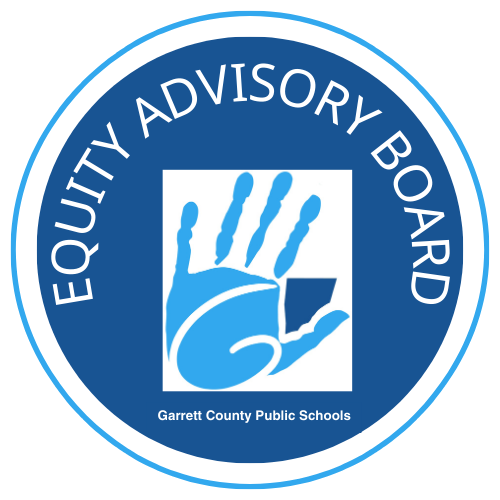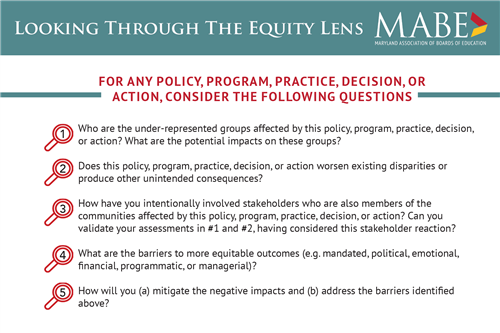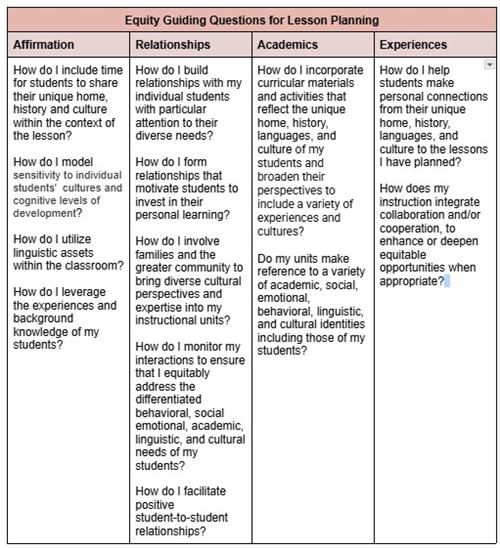- Garrett County Public Schools
- Equity Advisory Board
Superintendent
Page Navigation
-
Superintendent's Equity Advisory Board

Garrett County Public Schools is committed to fostering the success of each student in our schools. For success to occur for each student in lifelong learning and the world of work, the district prioritizes educational equity by recognizing and removing institutional barriers and ensuring that social identifiers are not obstacles to accessing educational opportunities and supports that benefit each student. Achieving equity means implicit biases and students’ identities will neither predict nor predetermine their success in school. Educational equity should be a lens through which all policies, procedures, and practices are viewed and decided. Additionally, equity is based on the principles of fairness and justice in allocating resources, opportunity, and treatment. It involves creating success for each student and striving to eliminate achievement and opportunity gaps. Educational equity promotes maximizing the academic success and social/emotional well-being of each student as well as between diverse groups of students. Equity strategies are intentional, systemic, and focused on the core of the teaching and learning process.
The Superintendent created the Equity Advisory Board (EAB) in March 2024. The Equity Advisory Board consists of 12 members including the Superintendent, the Director of Student Services, parents, and community members. The EAB meets quarterly to hold in-depth discussions about equity and inclusion, where members can share perspectives, challenge assumptions, and propose solutions.
JB Educational Equity Procedure

For any policy, program, practice, decision, or action, consider the following questions:
- Who are the under-represented groups affected by this policy, program, practice, decision, or action? What are the potential impacts on these groups?
- Does this policy, program, practice, decision, or action worsen existing disparities or produce other unintended consequences?
- How have you intentionally involved stakeholders who are also members of the communities affected by this policy, program, practice, decision, or action? Can you validate your assessments in #1 and #2, having considered this stakeholder reaction?
- What are the barriers to more equitable outcomes (e.g. mandated, political, emotional, financial, programmatic, or managerial)?
- How will you (a) mitigate the negative impacts and (b) address the barriers identified above?
Components of Culturally Responsive and Equitable Education
- Affirmation: I recognize your home, history, languages, and culture are aspects of your identity and influence what you bring to our learning environment. I will build on your life experiences and incorporate them into the classroom. I recognize and accept you as you are.
- Relationships: I will build a relationship with you and learn from our similarities and differences. I will collaborate with others by working interdependently in all aspects of school. I will draw upon the experiences and expertise of families and the community to enhance instruction.
- Academics: I will deliver curriculum and instruction that serves the needs of all students through Universal Design of Learning using differentiation and engagement to ensure all students are accountable to the Maryland College and Career State Standards (MCCSS). I will use an equitable lens to provide all populations, including underserved student groups, with the support needed to succeed at grade level standards and beyond.
- Experiences: I will enhance instruction by incorporating practices and materials that reflect the voices, learning styles, backgrounds, and experiences of my students. I will differentiate to accommodate multiple languages as needed.

Superintendent's Equity Advisory Board
- Chair: Dr. Brenda McCartney, Superintendent
- Co-Chair: Jennifer Kotulak, Interim Director of Student Services
- Kayley Davis
- Jennifer Fike
- John Ford
- Michael Fratz
- Sherri Fredlock
- Carrie Hook
- Sadie Liller
- Cadence Natividad
- Rachael Ramos
- Heather Roth

